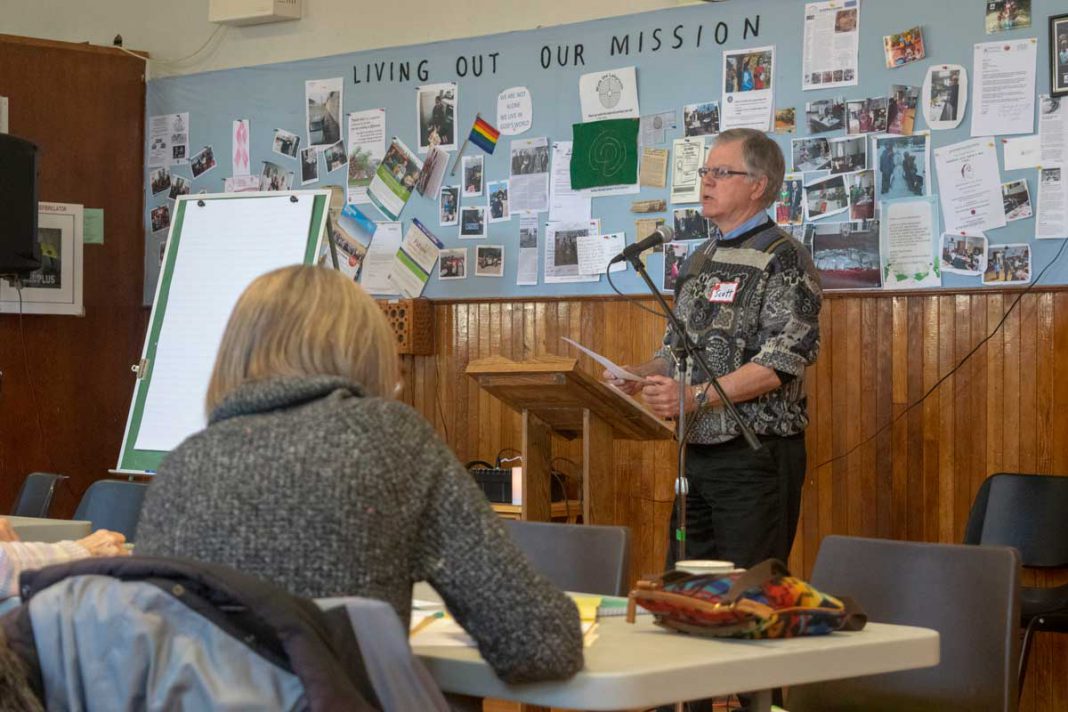LITTLE CURRENT – At the second-ever cluster meeting of United Churches in the Manitoulin, Espanola and North Shore regions, the host Little Current Pastoral Charge (LCPC) presented a resolution regarding the ministerial appointment of an atheistic minister in a Toronto united church.
“What I’m looking for is your concurrence, your support, your endorsement, something like that so we can build the momentum and keep pushing this forward to the regional council, and ultimately, I’d like to see this get to the national church,” said Scott Mosher, chair of the church council in the LCPC. He was requesting those gathered to write letters in agreement to further the chances of getting the motion noticed.
The group’s action on this front dates back to January, when the church council sent a letter to the United Church of Canada in protest of its decision to allow Rev. Gretta Vosper remain as the minister of West Hill United Church in Toronto, despite her public stance as an atheist.
In early February, Mr. Mosher received a response from the church from Rev. Alan W. Hall, executive officer of ministry and employment and human resources at the United Church of Canada. He stated the settlement process changed the role of the national organization.
“With the parties arriving at a settlement acceptable to them, the general council no longer had any authority to continue with the formal hearing. While we may not agree with the conclusion that the Toronto Conference arrived at in this matter, it was their decision to make,” wrote Rev. Hall.
The LCPC had expressed their concerns that a decision of this nature could possibly set precedent for future disputes of faith, potentially leading to the weakening of the faith-rooted traditions of the United Church.
In the letter, Rev. Hall stated that the settlement reached between the two parties in question does not involve precedent.
“Its conclusion in no way changes or influences denominational policy or doctrine. Nor does it establish a precedent that binds any future complaint,” he wrote, adding that any substantive changes such as an adjustment to faith requirements would have to undergo a multi-year, transparent decision-making process that would involve a full majority (more than 50 percent of eligible voters voting ‘yes’).
“For these reasons I remain confident in the integrity of the faith and the doctrine of the United Church of Canada,” he concluded. “As you have done, coming back to our base of belief and reaffirming who we are and whose we are takes control of this discussion.”
Mr. Mosher said several others had written similar letters of concern to the national body and he felt that this was a standardized response that didn’t fully address his concerns about what actions the church would be taking in the future should this situation arise again.
“I have spoken with others in the church and it’s left a bit of a sour taste in their mouth—this incident, the settlement that’s been reached,” said Little Current United Church Pastor Paul Allard.
Mr. Mosher told the gathered meeting that a September 2016 report into Rev. Vosper’s ministry had deemed her not suitable to continue as an ordained minister. However, a statement released in November 2018 from Toronto Conference stating that the issues had been settled and Rev. Vosper would remain in the ordained ministry at West Hill. He wondered aloud what had changed between the two dates.
This decision also comes among studies that as many as one third of churches in Canada are expected to close within the next decade, calling for a strengthening of the church community.
“We’re not trying to go after anybody, we would just like to see that, going forward, the United Church tighten its procedural matters in these regards a little more closely,” said Pastor Allard.
Church members Betty and Ivan Edwards also wrote a letter to United Church of Canada general secretary Nora Sanders in early March and requested a personal response. One month later, they received a phone call from Ms. Sanders who informed them that the decision was out of their hands. She added that she was sorry for the theist ministers who have to live with the decision that had been made, but said it offered an opportunity for many to strengthen their faith.
Rev. Don Nelson was in attendance to represent the churches in Western Manitoulin and said he had distributed a five-point questionnaire at a Sunday service as well as through email to other members not present. Of the 74 surveys, they received 41 responses.
A total of 80 percent of the respondents rated the degree of their displeasure with Rev. Vosper’s continued ministry, on a scale from one to 10, as an eight or higher. A further 84 percent said they would not accept an atheist minister in Western Manitoulin and a similar proportion said it would affect the local church. Nearly half said it would change their relationship with the United Church of Canada.
Based on the concerns of the church community, Mr. Mosher and church member Rick McCutcheon teamed up to write a draft resolution for an upcoming United Church of Canada general council meeting.
The resolution requests a strengthening of the policies of regional council oversight over communities of faith, Office of Vocation oversight of ministry personnel, accountability and Office of Vocation action on ministry personnel. This move was aimed so that more action would be taken in the future if a minister renounces their vows.
“I thought it was well-written and spoke constructively on how to move forward with some suggestions of how the church could potentially deal with matters of this nature,” said Pastor Allard. “It was really nice to see the council step forward to put this letter together. I really couldn’t craft it better myself.”
Although the Rev. Vosper settlement is final, Mr. Mosher said he hopes this may lead to stronger policies for the future, something integral to the operations of some of the largest organizations in the world such as corporations.
“What I am hoping for is that between the Canadian Shield Region and the national church, that they’ll take the appropriate steps to identify, investigate and implement the appropriate steps so we don’t find ourselves as a national church in this predicament again,” said Mr. Mosher.
“This shouldn’t shake anyone’s faith necessarily; this is just one individual who’s taken an extreme view of divinity by calling themself an atheist. I don’t think that’s representative of ministers in the church and who we are as a faith community,” said Pastor Allard.
Since the cluster meeting, the motion has been added to the Canadian Shield Regional Council meeting’s agenda, held in Sault Ste. Marie from May 31 to June 2. Mr. Mosher said he may attend the meeting.





